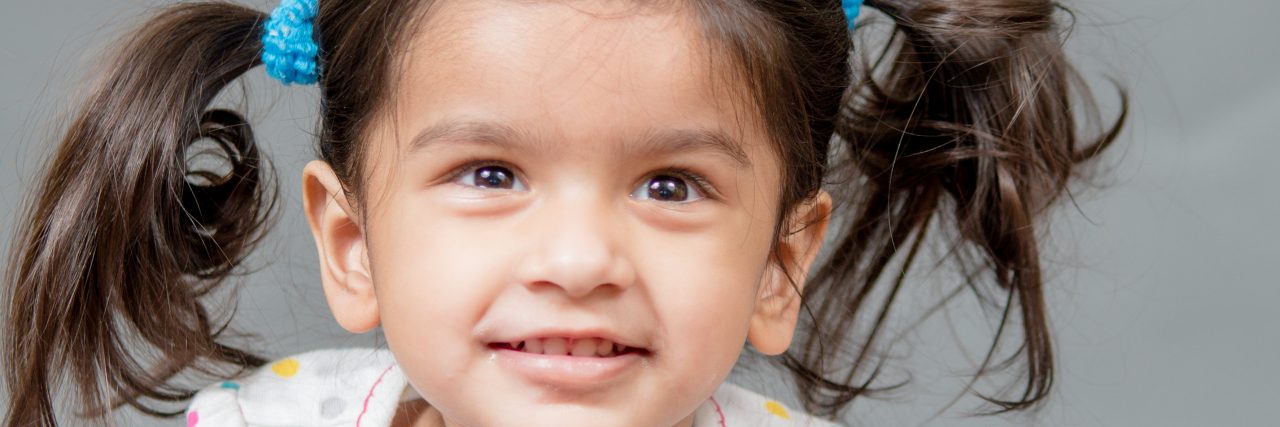I have spent the past year waiting for my daughter to die.
Findings and opinions were many.
A one-in-billions genetic mutation.
Only three known cases in the world.
“She’ll be dead by 15 months.”
“Enjoy your time together.”
That was the initial prescription – “enjoy your time together.”
Everything had been fine. I was living the dream. Beautiful little girl, loving family, fulfilling job.
It is really shocking how abruptly you can lose everything. Or think you have.
Anakha had been fine. There were no alarm bells. She was a “typical,” happy little 9-month-old.
Then, one day, she stopped crawling.
“She’s just tired. It’s the heat.”
“Don’t be ridiculous, Mama! She’s fine!”
Over the next four weeks, she lost independent sitting, rolling, grasping, and finally neck control. She stopped babbling. At 10 months, she had the motor functions of a 2-month-old. An MRI showed progressive cavitating leukoencephalopathy, which means there are holes in the white matter of Anakha’s brain, which controls all motor functions or movement. The doctors hinted at a “mitochondrial disease” but would not provide further information without a diagnosis.
At 13 months, the official diagnosis came. Multiple mitochondrial dysfunction syndrome – type 3. A rare genetic condition. Only three cases reported in the literature. The doctors told me she would only regress, that next to go would be the ability to chew and swallow safely. She would need a feeding tube. Then a breathing tube. And by around 15 months old, she would be gone.
Anakha was written off.
So what do you do when you find out your child is dying?
I will be honest. At first, you cry and scream. You grieve. You mourn. Your hopes and dreams, your future is shattered.
Allow yourself enough to feel the pain. You may carry the horror of that moment for the rest of your life. But when you emerge, you might be the strongest version of yourself there is.
You will do everything for your child. Anything for your child. You will push yourself to extremes unknown. You will tirelessly advocate for the needs of your child.
Mothers of children with these diagnoses, imminently terminal or not, are the toughest people I have ever met. I am proud to count myself among them. If you need to get something done, call one of us.
We are warriors.
You learn how precious time is. Every moment must count. No wastage. You weed out everything superfluous in your life. What used to be major calamities to you are now laughable. Oddly enough, you may ease up and develop a dark sense of humor. You learn to live with the grief. It is always there and catches you in unexpected moments.
One of my Achilles is while driving alone, glancing into the rearview mirror and seeing that She. Is. Not. There. It reminds me that one day she may really not be there, permanently.
You can become financially unstable. Medical bankruptcy is real. You find creative alternatives for employment just to survive. I started my own legal practice, something I never thought I could do, as it gives me the flexibility to be home with Anakha and still engage in meaningful employment. It’s going well.
People you expected to lean on in a crisis either step up hugely or cannot handle it and fade away. You are hurt at first, but then move on because they do not matter anymore. And people you never expected to care become your rock.
So what did I specifically do for Anakha?
I did not listen to the doctors. I would not write her off.
It is astounding how common Anakha’s story is, of children being written off, only to defy the odds. She should be an outlier, but I have heard the same story repeatedly from other families.
As soon as I heard “mitochondrial disease,” or as we call it, “mito,” my science background kicked in. I researched, advocated for medications and services, contacted doctors and researchers around the world who study her specific condition and gene.
Anakha is now 27 months old. She has regained head control, grasping, rolling, independent sitting for short periods of time, and weight bearing. Her vision has improved. She gets around in a homemade wheelchair, made by my crafty mom. She can speak in short sentences and understands everything.
And her favorite words? “I did it!”
As a caveat: hope, love, prayer, belief and hard work do not mean your child will survive. But it may give them a chance.
Anakha is surrounded by a supportive group of doctors, therapists and family who believe in her and her potential.
Now, instead of waiting for my daughter to die, I live and laugh and enjoy our life together.
We live.
Follow this journey on Reboot Social.
We want to hear your story. Become a Mighty contributor here.

